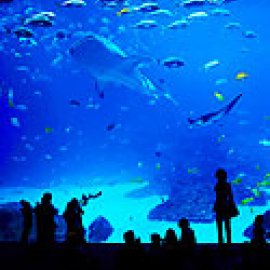The Children Will Set Us Free
-
English
-
ListenPause
[intro music, ocean sounds]
Welcome to World Ocean Radio…
I’m Peter Neill, Founder of the World Ocean Observatory.
The ocean is a sensory place, stimulating ourselves through all our senses -- the salty taste and touch, the smell of seaweed and tanning oil, the sound of waves scraping over sand and shells back into the sea, indeed, overall, an associated sound of children shouting and laughing as they play alongshore by the fulsome ocean. The sound of children laughing and shouting is like a clarion call for the future; it signals the existence and vitality of the next generation, hope personified.
Thinking over the last decades and our struggle between our commodified life and profligate use of the environment with the evident degradation of our air, land and water, I have often heard the questions: why are we doing this to our children? what legacy are we leaving for their children? If we recognize the consequence and challenge of our past values, structures, and behaviors, why is it that we cannot acknowledge the fact of regress and move with collective commitment to progress instead? Are we simply imprisoned by our history, and, even with all our awareness and ability, incapable of sustaining the best of our life for others, enabling ourselves by enabling Nature, yes the healing to be found in that sensory place, the ocean.
Will the children set us free? Has it come to that? Have we abandoned our future for them to solve, leaving them accountable in their lifetime for what we have failed to do in ours? If so, it is a sad comment on all of us who have created, enjoyed, and passed on a dark legacy of irresponsibility and inaction.
What will it take? Is there time for each of us in the fullness of our lives to act on behalf of grandchildren playing by the ocean, their sisters and brothers still unborn? Of course there is, although recent history might argue against. There is a complacent force abroad that argues for the taking, until it is all gone, ironically in the name of an idealized notion of community and family that is self-satisfied illusion until come the storm, the fire, the unbreathable air, the undrinkable water, from which even all the accumulated wealth of their moment will not, cannot buy adequate supply. We will have consumed our world, and ourselves, until there is no more. That is unfair and an ultimate betrayal of those laughing children.
Frankly, I am conflicted by the prospect of what’s to come. On one hand, I see a generation pre-occupied by entertainment, protected in apparent safety, mostly unaware of the opposite circumstance of so many other children in other places savaged by irrational violence, poverty, broken family and dis-connection. It seems so easy to avoid that awareness and to assume that all will carry on for us, safe and sound.
Where I find my hope in and for the next generation is derived from response to the World Ocean Observatory’s educational initiative, World Ocean Explorer, an immersive, online experience that introduces children worldwide to the complexity, significance, and beauty of the ocean which gives us so much: freshwater, food, energy, health, wealth, community, security, and cultural/spiritual traditions. Explorer is in classrooms today in the United States, the Caribbean, Europe, Asia, and Africa; children are using it as a transformational tool for discovery, not just of natural ocean systems, but of all the other ways the ocean serves us through responsible inter-action and exchange. In a time of disconnection – between political factions, races, national agenda, religious beliefs, economic inequality, and more – those students are finding science and solace, opportunity and joy, in an immersion, virtual but accessible at no cost to all, to a natural system that, yes, connects, protects, and serves them all to inform their future. I am seeing photographs of those kids – in a one-room schoolhouse on an island in Maine, an impoverished coastal classroom in Africa, a beach-front middle school in the Bahamas – and I can sense their engagement; I can see their enthusiastic reaction to the wonders of the deep sea; I can see their joyful response to the science and explanation; I can feel their laughter in the sharing; I can sense and embrace the restorative certainty in the truth that, yes, the children will set us free.
We will disuss these issues and more, in future editions of World Ocean Radio.
WORLD OCEAN RADIO IS DISTRIBUTED BY THE PUBLIC RADIO EXCHANGE AND THE PACIFICA NETWORK, FOR USE BY COLLEGE AND COMMUNITY RADIO STATIONS WORLDWIDE. FIND US WHEREVER YOU LISTEN TO PODCASTS, AND AT WORLD OCEAN OBSERVATORY DOT ORG, WHERE THE FULL CATALOG OF MORE THAN 700 RADIO EPISODES IS SEARCHABLE BY THEME.
[outro music, ocean sounds]Will the children set us free? Has it come to that? Have we abandoned the future for our children to solve, leaving them accountable for what we have failed to do? This week on World Ocean Radio host Peter Neill shares where he finds hope for the future, including in a web-based educational initiative that introduces children worldwide to the complexity, significance, and beauty of the ocean--the one ocean which gives us so much: freshwater, food, energy, health, wealth, community, security, and cultural/spiritual traditions.
About World Ocean Radio
World Ocean Radio is a weekly series of five-minute audio essays available for syndicated use at no cost by college and community radio stations worldwide. Peter Neill, Director of the World Ocean Observatory and host of World Ocean Radio, provides coverage of a broad spectrum of ocean issues from science and education to advocacy and exemplary projects.
World Ocean Radio
15 Years, 750 Episodes
Ocean is climate
Climate is ocean
The sea connects all things
- Login to post comments



